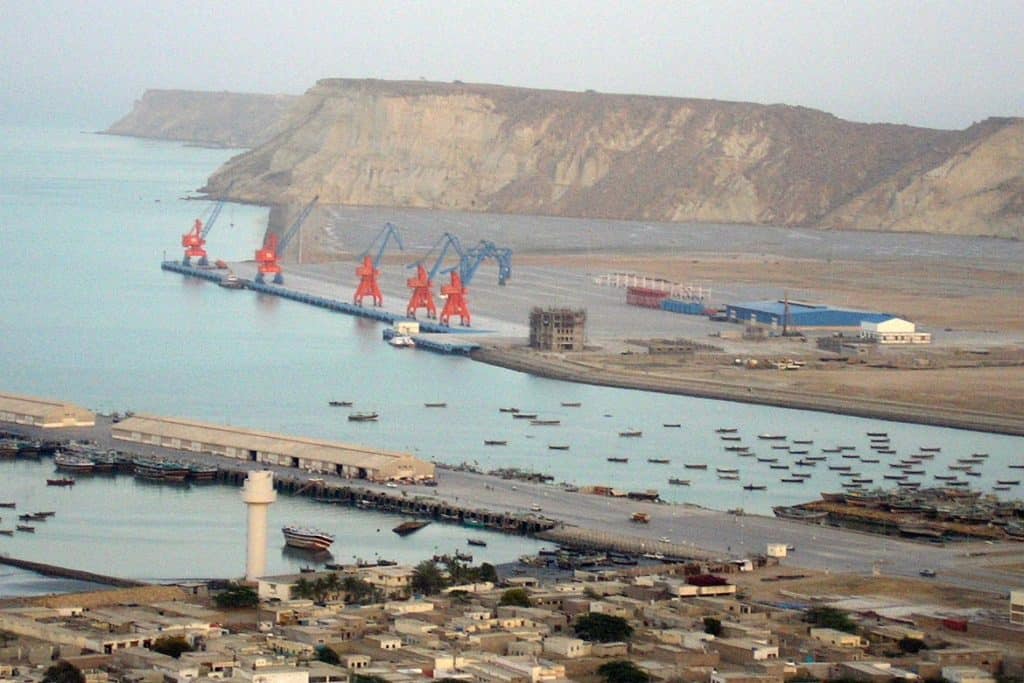China-Pakistan Economic Corridor (CPEC) is one of the most ambitious foreign investment projects by China under the framework of ‘One Belt, One Road’ initiative. It is a 3000km long corridor which will connect Xinjiang in China to Gwadar port in Pakistan.
The project was announced in April 2015 during the state visit of Chinese President Xi Jinping. He said in the opening statement, “This will be my first trip to Pakistan, but I feel as if I am going to visit the home of my own brother.” The then Prime Minister of Pakistan, Nawaz Sharif, and Chinese President XI Jinping signed the agreement which was originally valued at $46 billion. The current value of the project is $62 billion.
CPEC is the collection of infrastructure projects from Gwadar port in Pakistan to Xinjiang province in China. The various projects include- modern transportation networks, numerous energy projects and special economic zones. $11 billion dollars was invested for infrastructure projects and $33 billion dollars was invested for energy projects during the signing of the agreement.
Pakistani officials have predicted that the China-Pakistan Economic Corridor will create job opportunities for approximately 2.3 million people between 2015-2030 adding 2 to 2.5% to the country’s economic growth.
In 2016, CPEC became partly operational when a Chinese cargo was transported to Gwadar port for onward maritime shipment to Africa and West Asia.
According to recent news reports, Saudi Arabia has been asked to join China-Pakistan Economic Corridor as third-party investor. Both the countries had during the agreement agreed that any third-country which shares a cordial relation with both China and Pakistan can invest in the project.
Saudi Arabia has agreed to the offer by Pakistan and is ready to make huge investments in CPEC. When asked whether China was consulted before asking Saudi-Arabia to join, the Pakistani official told the media that China was first taken into confidence and then they asked Saudi Arabia to join.
But how exactly does CPEC pose a threat to India’s sovereignty?
The China-Pakistan Economic Corridor passes through Gilgit-Baltistan which is in Jammu and Kashmir and both the countries have asserted claims. India believes that once the construction starts, there will be an interference from armies of the both the countries which will also turn out to be a security threat. They fear the influence of Pakistani army in the region which is already disturbed and hence claimed that this project will pose a threat to India’s sovereignty.
Other concerns for India
Another concern for India is the internationalization of the Kashmir issue which India does not want. From the beginning, India has believed that the Kashmir issue should be solved through bilateral negotiation. The same feeling is expressed by United Nations to which Pakistan does not agree. It believes that the Kashmir issue can only be solved only by the decision from the United Nations.
India also fears that China will no longer remain neutral on the Kashmir issue which it has since 1963 because of its growing relations with Pakistan. India fears that influence from Pakistan might turmoil India-China relations.
Many think tanks believe CPEC to be a Marshall Plan. Marshall Plan is a term used by the Americans to denote the time when United States helped Western Europe economically after the second world war. The think-tanks believe that China is helping Pakistan to expand its economy and giving them the opportunity to grow their economy.
If CPEC turns out to be a success, Pakistan will become a key destination for many other foreign investments as many of its resources are still untapped.
The Pakistan economic growth will give it more means for developing its military outputs. And this is another reason of concern for India. Pakistan may deploy more army on the borders it shares with India and might disrupt the peace on the border.
India also worries that with the economy growing, there is a very high possibility of increase in terror activities. India has slammed Islamabad for not taking necessary steps to stop cross-border terrorism and they fear that Pakistan may use force to capture Kashmir or they might use terrorism once the economy of the country improves.
Is there any possible positive outcome of CPEC for India?
Many analysts have observed that once the CPEC becomes fully operational, there is a possibility that it will give the Kashmir issue its final closure indirectly. Once the route becomes operational, both the countries will then make a peaceful agreement as to how land each country controls.
Conclusion
China-Pakistan Economic Corridor agreement was signed in 2015 under Pakistani Prime Minister Nawaz Sharif. In 2016, the current Pakistani Prime Minister Imran Khan’s party Tehreek-e-Insaf, who was in the opposition then, had strongly objected this project. They criticized the then Pakistani government’s alleged re-routing of the corridor in favour of Sindh-Punjab provinces at the expense of north-western Khyber-Pakhtunkhwa.
In a recent statement to a leading newspaper, Abdul Razak Dawood, Pakistan Prime Minister Imran Khan’s Adviser on Commerce, Textile, Industry & Production and Investment said that the Chinese government did not completely safeguard the economic interest of Pakistan. He also said that maybe the government can put the project on hold for now. He said, “Perhaps we can stretch CPEC out over another five years or so.”
With a possibility of a major conflict between the new Pakistani government and the Chinese government due to the differences in their opinions on CPEC, it could be interesting to see if and how Pakistan, China and India will take benefits from this complex situation.







